Imperial Packs — Into the Forbidden City
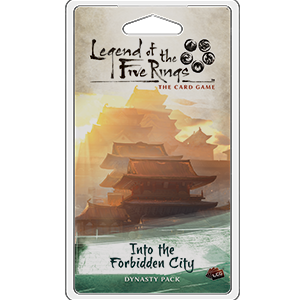
Details of the third dynasty pack of the Imperial cycle is out! Let’s get stuck in and see what it has to offer each clan.
Crab

The Hiruma Skirmisher is a 1 cost conflict character with 1 military, — political, and 1 glory. When the character is played, he gains covert until the end of the turn. This is similar to the Dragon conflict character Tattooed Wanderer but rather than having to choose between a character and covert, you get both. This does come at a compromise, the Skirmisher has less military and cannot assign to politic conflicts and the covert only lasts for 1 turn rather than sticking around as an attachment. On the other hand, the Skirmisher allows you to drop a surprise character and attack with that character and also has 1 glory which can be important to contest the imperial favor in some niche circumstances. As the Crab already have decent military skill, the lack of political on the Skirmisher is limiting. This is still an exceptional card for the Crab, being able to prevent a character from assigning to defend for just 1 fate will win games.
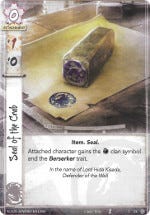
Just like the other Seals, this is a 0 cost attachment which gives +1 to a skill, a faction icon, and a trait. In this case, the skill is military, and the trait is Berserker. Right now that doesn’t mean much, but we do know that the upcoming Crisis Breaker straightens Berserkers with his ability. Like the other seals, I’ll be surprised if they see play without some later support.
Crane
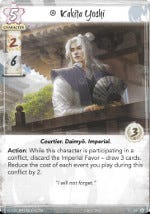
Kakita Yoshi is a 5 cost character with 3 military, 6 political, 3 glory, and the Courtier trait. Yoshi has an ability that can only be used in a conflict and requires discarding the imperial favor. The effect draws 3 cards and reduces the cost of all events by 2 for the remainder of the conflict. Without the imperial favor, Yoshi is an impressive stat line with the Courtier trait which is very relevant for current Crane decks. Once Yoshi is in play it will be a race to grab the favor, possibly leaving characters unbowed to try to grab it with higher glory. If you can get the favor, you’ll probably be playing a few Test of Skills for free, drawing even more cards. The combination of card draw and cost reduction will almost definitely win you the conflict. In addition, it will set you up nicely for future conflicts and will put you into a strong position to regain the favor for next turn.
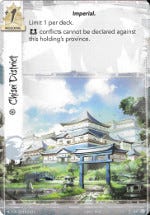
This card has all the same issues we talked about with the similar Lion district Hito District. Currently unplayable.
Dragon
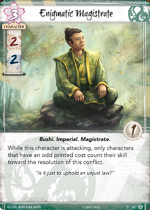
This is the Dragon’s entry in the Magistrate theme where characters skill will not apply during conflict resolution under specific conditions. Enigmatic Magistrate is a 3 cost 2 military, 2 political, and 1 glory Bushi character. While attacking only characters with odd fate costs apply their skill during resolution, so only 1 cost, 3 cost, and 5 cost characters get their skill. I’m assuming here that this game considers 0 to be even. The stat line isn’t great, and he doesn’t have a trait the Dragon are interested in. So this is all about the ability. As with the other Magistrates, anything that changes the way the game is played is a powerful tool. In this case, if it is not to your advantage then you only assign the Magistrate on defense, negating his ability. He also allows for a powerful charge target, unexpectedly changing how a conflict will play it. Unlike many of the other Magistrates, the Enigmatic Magistrate will depend on what characters other clans are playing. If the most played characters are even cost, then the Magistrate will be very reliable, but if they are odd, then he won’t be.
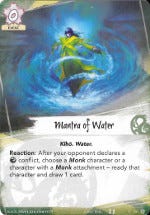
This is the second Mantra after the Mantra of Fire. When your opponent declares a Water conflict: you can play this card, straighten a monk character (or character with monk attachment), and draw a card. Looking at this card, it’s surprising the Mantra of Fire doesn’t honor a character instead of adding fate. It will be interesting to see what the eventual Mantra of Void will do. Mantra of Fire did not see play in the core environment due to how conditional it is and the low number of playable monks. With the increase in card pool, the monk pool is increasing for the Dragon which will help this. The second condition is your opponent selecting the ring in question, until they do this card sits in your hand unused. A typical game will take 3 to 4 turns with your opponent declaring around 6 conflicts in total. Initially, ring selection will be dependent on the rings effect on the board state, but as the game progresses the fate sitting on the rings becomes more important. So it is likely that your opponent will at some point select the water ring. Will you have the monk you need in play? Will that monk be bowed? Will you have drawn the Mantra of Water? If you do this will be a big effect and will replace itself with another conflict card. If you don’t, it is a dead card. Right now, I think Mantra of Fire is better as the monk can be bowed or unbowed. Once that sees play, we can start thinking about Mantra of Water.
Lion
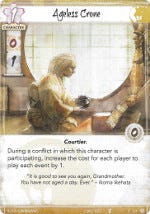
This 1 cost conflict character has 0 military, 1 political, 0 glory, and the courtier trait. While she is in the conflict, she increases the cost of events for everyone by 1 fate. A typical deck has around 50% of the conflict deck at 0 cost with the majority of the remainder around 1 fate. Dropping the Ageless Crone into a conflict shuts down your opponents ability to play any more events if they have 0 fate. This is a surprise Guest of Honor for 1 fate. Even though only 0 military skill, the Crone can be in military conflicts. As a Courtier, she makes cards like For Shame! more reliable in Lion although it would cost 1 fate. With 1 political she can win a surprise political conflict where the Lion are usually weak. This is a truly stunning character that will allow Lion to lock in a conflict where they are already ahead. It’s very presence will encourage other clans to play their events early before the Crone makes her appearance.
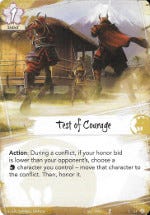
Test of Courage is a 1 cost event that can only be played during a conflict when your honor dial bid is less than your opponent. In the core environment, Lion have been pretty consistent in bidding low trying to keep their honor higher than their opponent for specific cards effects. Nonetheless, this condition can be problematic as the card Good Omen shows. Many games lock into an equal bid rhythm with both players bidding the same 5 or 1 turn after turn. If you can manage to bid lower than your opponent, you can move a Lion character you control into the current conflict and honor them. Honoring a character is a great skill boost for Lion and also lets them stay around a little longer with Stand Your Ground. Move in abilities help support an army where your opponent has more than expected skill or has played actions that unexpectedly increased their skill or reduced your own, such as with send-home actions. This is a pretty great card, but you have to wonder, why didn’t the Lion character assign in the first place? This combined with the often tricky bidding condition could push this out of contention for a slot in the already packed Lion conflict deck.
Phoenix
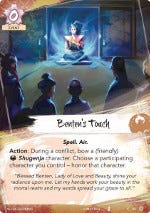
Getting characters honored and keeping them that way is key to a successful Phoenix deck. Phoenix characters innately have high glory scores, and once you have an honored character, the stronghold becomes a +2/+2 bonus for that character for the remainder of the phase. Benten’s Touch is a 0 cost action that can only be played during a conflict, it requires a friendly Phoenix Shugenja who bows as part of the cost. The effect honors a participating character you control. While any Phoenix Shugenja bow for the action, you really only want to bow your cheap characters with low skill. There are 4 Pheonix Shugenja who cost 2 or less, Adept of the Waves and Solemn Scholar on the dynasty side and Seeker of Knowledge and Ishiken Initiate on the conflict side. These typically are 1 to 2 skill which bows to honor a 2 to 3 glory character and then use the stronghold. As the new Phoenix role is the Keeper of Water, this action will provide a target to unbow when a water conflict is successful.
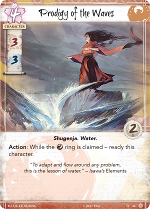
This Shugenja is 4 cost for 3 military, 2 political, and 2 glory. If the water ring has been claimed, either by you or your opponent, the Prodigy can take an action to ready. The cost and stats here are the same as the Niten Master who is considered by some as the true Dragon champion. Like the Niten Master the Prodigy can ready and get involved in multiple attacks. Phoenix currently have the Keeper of Water role, so they have an incentive to claim water. In addition, they have Adept of the Waves who gives covert in a water conflict, making taking water that little bit easier. Benten’s Touch from this pack also provides a target to ready, as it has a bow cost. The interactions can be seen with the example: Use the Adept’s ability on the Prodigy. Use the stronghold to increase the Prodigy’s glory. Declare a water conflict with just the Prodigy. Bow the Adept during the conflict to cast Benten’s Touch honoring the Prodigy going to 7 skill. Win the conflict claiming the water ring. With the water ring straighten the Adept, then straighten the Prodigy with her own ability. Importantly, the Phoenix player does not need to have the water ring themselves. If the Prodigy attacks for a water conflict they can choose to lose and let the defender win the ring, then after defenders bow out the Prodigy can ready. This is an exceptionally cool card that fits straight into the Phoenix decks.
Scorpion
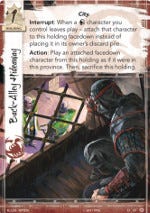
This +1 province strength holding can stop a Scorpion character from going to the discard pile and instead attaches them to the holding. As an action, you can then play that character again as if they were in the province by sacrificing the holding. There are some questions over exactly how this works, if you are treating the character ‘as if it were in this province’ does that mean you can only take the action during your dynasty phase? Or is the action playable at any time? If it is possible to take the recruit action at any time, this could potentially bring a character back immediately. For example, a Shosuro Actress could end up simultaneously playing two characters.
Either way, you have to ask yourself what the goal is. Instead of playing this holding, you could be playing another character. If you reveal this holding turn 2 or 3 you will be able to choose the best character you have in play to ‘save’. On the other hand, if you draw this holding turn 1 it isn’t going to be much help. Even with some fun interactions, it really isn’t doing much for your deck and I suspect this is a card that won’t see a lot of play.
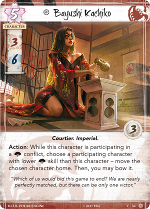
Kachiko is a 5 cost conflict character with 3 military, 6 political, and 3 glory. She has the Courtier and Imperial traits and a send home ability. Her ability can only be used while she is in a political conflict and can send home a participating character with lower political skill than her. After they’ve been sent home you can choose to also bow them. Send home is a great way to deal with problem characters who have actions you want out of the conflict, but it lets them assign to another later conflict. That Kachiko can also bow them gives her the best of both worlds. This send home ability is not limited to opposing characters, so it can also be used to send home a friendly character. This opens up the option of a feint if your opponent chooses not to defend. At 5 cost Kachiko is the most expensive conflict character we have seen and could help the Scorpion stabilize a bad dynasty turn by saving all their fate for Kachiko later in the turn. As she is unique you can discard another copy of her to add 1 fate to her, but can only do so during the dynasty phase. As you cannot play conflict characters or attachments during the dynasty phase you will need to play Kachiko with at least 1 additional fate if you’re hoping to get the benefit of discarding another copy of her. This is an awesome card for an awesome character that we are delighted to see.
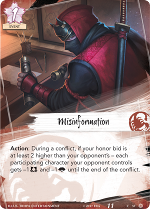
This 1 cost event requires you to have a bid dial at least 2 higher than your opponent, so if our opponent has bid 1 you would have bid at least 3. When looking at Test of Courage we talked at some of the issues relating to bid dials. Scorpion already know this pain with I Can Swim which can require some work to use. Misinformation is unplayable if your opponent has bid 4 or 5, so this issue is magnified. Add to this that Scorpion currently have two styles of play, the first is to draw lots and win by conquest the second is to draw few and win by dishonor. Only the conquest style decks are going to be able to play Misinformation. The effect reduces gives opposing characters -1 military and -1 political, so this is going to be more effective the larger the opposing army is. Multiple copies could seal a game, either allowing you to not defend against a massive attack or to negate the defense of a stronghold. It is in those last battles where this card will have the greatest impact and unfortunately where it will be most difficult to play. If you consistently bid high, going into the last turn your opponent is likely to do the same. The issue with a consistent low bid is similar. It seems likely then, that the conquest deck is going to be able to make use of this during the early game but possibly not during the late game. Similarly, the dishonor deck would have to release the honor lock to play this during the late game. This is a powerful card, but if you’re not able to play it then it’s dead weight in your hand.
Unicorn
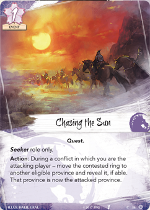
This Seeker only, 1 cost event, allows the Unicorn to change the province they are attacking to another province. For provinces which trigger on reveal, this isn’t going to help as the effect will have already resolved. For provinces with actions to take, the defending player will most likely take the action on their first opportunity. This card only makes sense if the Unicorn player has someway to take the first action. Even then, it’s not really doing much. You get to dodge out of the way of a dangerous province, but you’re likely going into an equally dangerous one. Unless there are specific provinces that cause problems for the Unicorn it’s not going to be much help.

And here we have a way to take the first action! This 1 cost cavalry character has 1 military, 0 political, and 0 glory. After a province this character is attacking is revealed, the attacker gets the first action. So it will only work when you attack a blank province. It will let you get the first action, this gives you the chance to deal with problem characters such as Doji Gift Giver before they have a chance to act. As a cavalry character, the Child of the Plains can be returned with Cavalry Reserves, while the ability won’t work it does help round out the numbers to the 6 fate total. The question then is whether this character is worth the province slot. At 1 cost he compares to the Seppun Guardsman trading the drawback and +1 military for the ability. Having a few cheap characters in the deck does help round out a turns dynasty spend making it likely this character will make it into decks, even if the ability doesn’t always have a direct application.
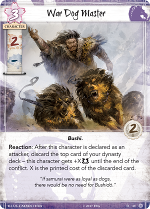
This Bushi character is 3 fate for 2 military, — political, and 2 glory. When it is declared as an attacker, you discard the top card of your dynasty deck and add the fate cost of that card as a +X military bonus for the turn. Worst case you flip a holding and it’s a +0 bonus; best case it’s Shinjo Altansarnai and for a turn the Master gets+5 military. Looking at the top Unicorn deck from Worlds, 35% of the time this is going to be a 4+ bonus making this a Moto Horde at a 1 fate discount. It isn’t going to work with Cavalry Reserves, something that seems to be an ongoing theme, as with Cavalry Reserves it is never declared as an attacked instead just appearing in the battle. As it actively discards characters, it may help the pool of targets for Cavalry Reserves. This isn’t the character the Unicorn were looking for.
Neutral
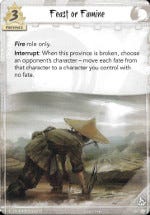
Feast or Famine is a 3 province strength fire province that can only be played by clans with a fire role. Currently, the Dragon and Lion clans have fire roles. When the province breaks, the defender can move all the fate from an enemy character to one of their characters with no fate. As a break effect, this is a one-shot only effect and if you don’t have a character with fate when it breaks the effect cannot be triggered. The effect is massive and will probably be a 2 fate swing from their best character to one of yours who would have been leaving. As this only has an effect when broken it runs the risk of being a ‘safe province’. Dishonor decks don’t want to break provinces, they just want to win air and fire conflicts. As long as they don’t accidentally break the province, they can continue to win rings off it. Dragon will be able to run an aggressive fate denial deck with this and meditations on the void. This will mean abandoning their clan province Restoration of Balance. Dragon may need to adjust their play style to make sure they have a character with no fate ready for the effect. The Lion on the other hand just need to slot this into provinces, they already have plenty of characters coming into play without any fate staying around for just a turn.
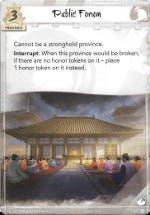
Earth provinces in the core environment typically ended up underneath the stronghold relying on the 5 province strength. Public Forum is different, it cannot be placed under the stronghold and has a small province strength of 3. Just before it is about to break it can take an action to prevent it from breaking. This is a once only option and the next time the province will break for good. In this regard, Public Forum is similar to Rally for the Cause. Rally has been the most popular water province in the tournaments run so far, it shifts the conflict often protecting itself from destruction the first time. Public Forum is a second option, slowing down the destruction of your provinces and giving more time for you to push towards your own victory. This also constitutes a ‘safe’ province in the same manner as Feast or Famine with similar risks.
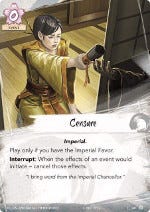
We were lucky enough to get the preview for this card and some of our ‘hot takes’ are available here. Voice of Honor and Forged Edicts are defining cards for the Crane and Scorpion respectively, and so far both clans have been very successful. As Censure is action cancellation, by itself, it doesn’t do much. If you are behind in skill it isn’t going to help you turn it around. If your opponent doesn’t have any good events to cancel it will sit as a dead card in your hand. Luckily, events are a cornerstone of the current environment, so Censure will always have a wealth of targets. The only real issue with this card is having the favor to play it. Turn 1, neither player will have the favor until the end of the conflict phase, so while it can have some niche uses, normally on turn 1 Censure isn’t useful. In the core environment getting the favor was a nice bonus for a good turn. In the Imperial environment, we can expect to see the imperial favor more hotly contested with characters ready at the end of the conflict phase to contest with their glory. This may give the Phoenix clan an advantage with their stronghold Isawa Mori Seidō. As a neutral card, Censure has the opportunity to impact the event environment. If it becomes commonly played cards with high fate costs such as Cavalry Reserves and Blackmail may become overly risky.

Getting to draw the best card out of the top 5 of your conflict deck is a fantastic effect. Having to bow a courtier for it is painful. Typically cheap characters don’t stick around, an Otomo Courtier normally is bought for 1 fate and leaves at the end of turn. If you attach the Missive to the Otomo Courtier, you end up paying 1 fate, playing a card, and bowing 2 political skill to draw that card. At the end of turn, both cards will leave play. A greater investment leaves the Courtier vulnerable to Assassination. More expensive characters will stick around longer allowing the Missive more uses. If you play the Missive on a big character such as Asahina Storyteller you’re losing out on much more skill, 4 in this case. Other characters need to be in conflicts for their abilities, Kitsuki Investigator, for example, would best use the Missive in a political conflict where he can still use his ability. There are some good options that strike a balance, the Favored Niece, another example, is only 2 military and 2 political skill and really is played for her ability which will still work while bowed. So, while the effect is great it needs to be balanced against the cost and investment. Scorpion dishonor decks may get the most use out of this card, allowing them to bid 0 and draw into key parts of their dishonor deck. Cheap courtiers such as the Bayushi Manipulator may actually be worth investing in to draw out that Assassination.
Summary
Phoenix are the big winners out of this pack. Benten’s Touch and Prodigy of the Waves both perfectly fill slots in their decks. Meanwhile, the Phoenix stronghold makes Censure far more reliably than with any other clan. Most of the clans get at least one character of note in this pack: Hiruma Skirmisher, Kakita Yoshi, Ageless Crone, Bayushi Kachiko, and Child of the Plains are all worth playing.
Sick of reading? Have a listen to the team going through the cards and get some different perspectives and some controversial hot takes!
